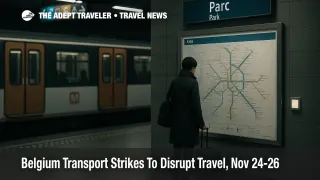Belgium Transport Strikes To Disrupt Travel, Nov 24-26

Belgium's main unions have called a coordinated three-day action from November 24 to 26, 2025 that will hit public transport nationwide. Rail unions have filed a 72-hour strike notice that covers intercity and regional trains operated by SNCB, and Brussels transport operator STIB expects "major disruptions" across the Metro, tram, and bus network. With the action spanning a Monday to Wednesday block, travelers should expect reduced frequencies, service gaps, and crowded alternatives on affected days, and should build larger time buffers for any airport or station transfer.
The rail component is the most far-reaching. Multiple unions announced that industrial action would begin at 1000 p.m. on Sunday, November 23, and run through 1000 p.m. on Wednesday, November 26. SNCB, Belgium's national rail operator, has signposted strike coverage and will publish minimum-service information as the dates approach, but prior multi-day actions have reduced passenger services to a skeleton timetable. If you are booked on intercity rail during the window, assume cancellations and plan a non-rail alternative where practical.
Brussels will feel the ripple effects beyond rail. STIB, which runs the capital's Metro, trams, and buses, warns that its network will be "heavily disrupted" on Monday, Tuesday, and Wednesday. Expect partial lines, long headways, and sudden suspensions as staffing fluctuates through the day. Real-time apps may offer incomplete data when too few depots are staffed to keep vehicle-location systems fully synchronized. For cross-city trips, allow extra time, consider walking between nearby stations to bypass closures, and keep a taxi or rideshare fallback.
Airport access adds another complication. Even if your flight operates as scheduled, reaching or leaving the airport could take longer. Brussels Airport's rail link often provides the fastest connection, but scheduled engineering works in the rail tunnel south of the airport from November 15 to December 9 already limit the number of trains. Layer the strike on top, and rail access may be severely constrained. Budget for coaches, shared shuttles, or taxis, and monitor your airline's guidance for check-in cutoffs and any transfer recommendations.
Union leaders frame the three-day action as part of a broader protest over federal budget measures and public-service policy, with a rolling structure by sector. Coverage plans point to rail and public transport on Monday, expanded public-service action on Tuesday, and a wider cross-sector strike on Wednesday. The practical takeaway is that the most acute travel impact is likely on Monday and Wednesday, with Tuesday producing localized slowdowns in public offices that can still affect trip logistics, for example visa counters or municipal services. Travelers should follow operator feeds closely in the 24 hours before departure.
Latest developments
As of November 12, operators and unions continue to confirm the November 24-26 timing, the 72-hour rail window anchored to the 10:00 p.m. start and end times, and the expectation of major transport disruption in Brussels. Check again during the prior weekend for any minimum-service announcements, contingency bus links, or legal requisitions that can alter coverage.
Analysis
For travelers, the decision tree is straightforward. If your plans rely on Belgian rail between November 24 and 26, move to a coach, rental car, or a confirmed rideshare that can stage at off-peak times. For airport transfers, especially to and from Brussels Airport, assume trains will be unreliable or unavailable and pre-book a car or shuttle. If you must use public transport in Brussels, leave double the normal transfer time, accept detours that keep you moving, and be ready to switch modes on short notice.
Background
Belgium's transport strikes generally operate within a notice framework, and while some minimum services can be mandated, enforcement is uneven across sectors. Operators typically publish coverage maps the day before, and they often avoid hard promises too early because staffing levels on the day determine what can actually run. That is why practical traveler tactics, such as early departures, backup ground transport, and flexible routing via unaffected corridors, matter more than any preliminary timetable.
Final thoughts
The November 24-26 strikes will not shut Belgium completely, but they will make rail travel and Brussels public transport unreliable for three days. Confirm your route 24 hours out, budget extra time for airport transfers, and keep a ready backup if your first choice fails. Those who plan around the constraints can still move, while those who rely on normal patterns may find themselves stalled.
Sources
- Belgian rail unions announce 3-day strike from 23 November
- Strikes and union actions | SNCB-NMBS
- Brussels transport to be severely disrupted by three-day strike
- National strike, service updates | STIB-MIVB
- Trade unions announce three strike days in November
- Traffic disruptions near Brussels Airport rail station, Nov 15-Dec 9
